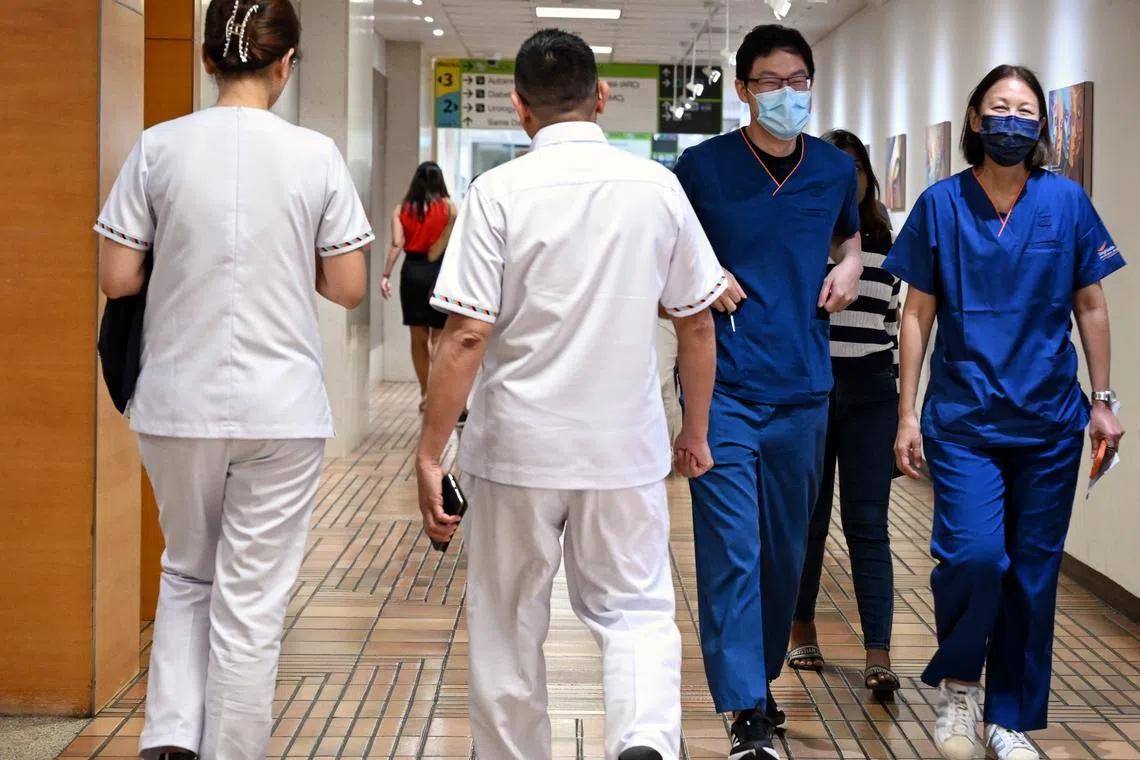63,000 public healthcare staff to get salary jumps of up to 7%
Sign up now: Get ST's newsletters delivered to your inbox

The Health Ministry said healthcare staff will continue to receive annual pay increments to keep salaries in pace with inflation.
PHOTO: ST FILE
SINGAPORE – Some 63,000 healthcare professionals in the public sector will get an increase of up to 7 per cent on their monthly base salaries from July 1 as the sector strives to better attract and retain staff.
Specifically, 37,000 allied healthcare professionals (AHPs), pharmacists, and administrative, ancillary and support staff will get the maximum salary increase of up to 7 per cent. The last salary increase for this group of healthcare professionals was in 2021.
Another group of 26,000 public healthcare nurses will also have their monthly base salaries bumped up, but the cap is at 4 per cent.
The adjustments are on top of the Award for Nurses’ Grace, Excellence and Loyalty (Angel) scheme launched in September 2024
“With these salary increases, which are over and above the annual increments, we will enable the public healthcare sector to better attract and retain staff,” the Ministry of Health (MOH) said in a statement on March 27.
The ministry said that healthcare staff will continue to receive annual pay increments, aimed at keeping salaries in pace with inflation. It added that healthcare workers are the driving force behind good care, and salary reviews are conducted regularly to ensure pay remains competitive.
“Beyond remuneration, we will continue to review our manpower development initiatives and improve opportunities for our healthcare workers through job redesign and career development,” said MOH.
Minister for Health Ong Ye Kung had in January announced the pay increase
The pay adjustments come amid rising demand in Singapore for healthcare workers, who will be attending to a greying population.
Nurses form the biggest group of professionals within Singapore’s healthcare system. But global competition for nurses intensified following the Covid-19 pandemic, especially after the borders started to reopen in 2021.
Among local nurses, the attrition rate was 7.4 per cent in 2021, up from 5.4 per cent in 2020. For foreign nurses, attrition more than doubled year on year to 14.8 per cent in 2021.
AHPs are also key healthcare workers here. They include physiotherapists, dietitians, occupational therapists and medical social workers – all of whom work alongside doctors and nurses in hospitals to support patients.
The proportion of AHPs who left the public healthcare sector rose from 8.9 per cent in 2018 to 11.6 per cent in 2022.
Singapore is planning to unveil a strategy later in 2025 that will better carve out the roles AHPs will play in the healthcare sector.
Dr Tan Wu Meng, chairman of the Government Parliamentary Committee for Health, said that increasing their salaries by up to 7 per cent is an important first step in attracting and retaining talent.
However, more needs to be done to raise public awareness of the importance of AHPs in healthcare, said Dr Tan, who is also an oncologist at the National Cancer Centre.
For instance, caregivers of elderly patients need not quit their jobs if a physiotherapist can help the seniors regain mobility.
“That kind of value is very important, and there is room to recognise that better,” said Dr Tan.
Professor Tan Bhing Leet, cluster director of health and social sciences at the Singapore Institute of Technology (SIT), said there is also a need to enhance career development opportunities for AHPs.
SIT, for one, has been working closely with MOH to provide the necessary clinical and professional training for AHPs to advance in their jobs.
Professor Liaw Sok Ying, head of the Alice Lee Centre for Nursing Studies at the NUS Yong Loo Lin School of Medicine, hopes that the higher salaries for nurses will attract more school-leavers to pursue nursing as a career.
“Given the global demand for nurses, it is inevitable that many of our nursing graduates will be attracted to opportunities abroad. This salary increase will not only improve the local job market for nurses, but also highlight that nursing provides competitive pay and opportunities for a global career,” said Prof Liaw.
In a statement, Healthcare Services Employees’ Union president K. Thanaletchimi thanked the three public healthcare clusters for their close collaboration to improve the wages of public healthcare workers.
Besides salary rises, other good outcomes like increases in salary ranges, as well as improved medical, dental and hospitalisation benefits, were also achieved, she said.
“Our healthcare workers are dedicated in their care for us. By recognising their dedication with wages and benefits that are both fair and competitive, we are reinforcing our commitment to their well-being. These enhancements will enable Singapore to continue attracting and retaining top talent, while strengthening our public healthcare system for the future,” said Ms Thanaletchimi.



